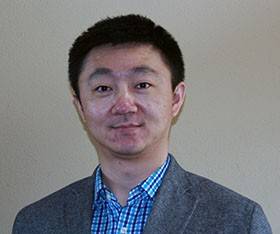Jun Zhang, Ph.D.

Jun Zhang
Project Scientist
Kimberly-Clark Corporation
B.S. and M.S., Polymer Science and Engineering, Nanjing University, P.R. China
Ph.D., Chemistry, Stony Brook University
Jun Zhang has developed and commercialized materials for the Kimberly-Clark adult and feminine care business for the past five years. This business unit is responsible for the Kotex, Poise, and Depends product lines. Zhang specializes in materials innovation technology. He works with his company's marketing staff to identify consumer needs and translate them into business opportunities and product improvements.
Zhang received his Ph.D. in polymer science and engineering in 2006. He had originally intended to find an academic faculty position, so he did a postdoctoral fellowship at the University of Massachusetts Amherst. Few academic positions were available when he completed his postdoc in 2008, so he posted his resume on Monster.com and searched their job ads. He saw a job posting from Kimberly-Clark that matched his background very closely, and he landed his current job by responding to their ad.
I am authentic, innovative, caring, and accountable. I have a mindset to continuously improve myself — knowledge changes every day, and you have to keep current.
Typical day on the job:
I have my own office at the Kimberly-Clark Neenah, WI, location. I spend about 40% of my time in meetings. About 10% of my time goes to email, 15% to planning, and 25% to data analysis and writing reports. This leaves about 10% of my time for process (working in the lab and at the manufacturing sites).
Work schedule:
I work a 40-hour week, but I sometimes come in early in the morning or stay late in the evening to communicate with colleagues in other time zones. Kimberly-Clark's Asian headquarters are in South Korea, so I have to plan phone calls with them for very early in the morning or late at night.
Travel schedule:
I am away from my workplace on travel from one to five days a month, on average. This may be as a guest lecturer at other universities, or visiting companies that are interested in my research. I attend several international, national and regional meetings, including Gordon Conferences and ACS meetings.
I go to conferences to get training and expand my knowledge. I attend an annual event and trade show sponsored by a trade association for non-woven fabrics.
I also help with new material trials here in Wisconsin, at the Kimberly-Clark sit in Roswell, GA, and at vendor sites all over the world. I visit our company's manufacturing sites in the U.S. and China to validate processes for new products and assist with their seven-day trials.
Tools you can't live without:
I use Microsoft Office and Internet Explorer, along with JMP software for working with statistics.
What you like most about your job:
I have the opportunity to develop innovative products through material innovation. I can use what I learned in school for a practical purpose. I also like responding to customer needs and making products that benefit the consumer.
Working in industry, I have gained an understanding of how business works. You have to come up with real-world solutions, give the customers what they want, and keep your products affordable.
Best productivity trick:
Think about the customer, understand the customer’s problem, and then find a novel solution to help them.
Best career advice you've received:
Get broader business experience, understand each step of business.
Skills or talents that make you a good fit for your job:
I am authentic, innovative, caring, and accountable. I have a mindset to continuously improve myself — knowledge changes every day, and you have to keep current. I spend almost half of my time working in teams, and building trust is very important. We have to work together, keeping the customer in mind. Sometimes the customer is the person who buys our products, and sometimes the "customer" is someone within the company who needs our assistance with a project.
Essential habit you wish you'd started earlier:
Think about customer needs.
Favorite ACS resource:
I recently found out about the ACS Leadership Development System, a set of courses that you can take in person or online. That will definitely be a benefit for my career. The national meetings and career resources have already been a great help.
How you've benefited from being an ACS member:
Making presentations at ACS national meetings lets me share my work with the ACS community. I am also getting training to improve my leadership. This year, I was elected chair of my local section, where I am working to promote academic and industrial interactions and increase members' engagement in events. Recently, I invited a local professor to give a talk to our local section on the aftermath of the Fukushima nuclear accident, which was very well attended. We have an upcoming banquet to recognize high school Chemistry Olympiad students and outstanding college seniors, and the speaker will be an industrial chemist who works on consumer products.

